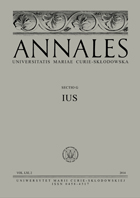Pojęcie przestępstwa i podziały przestępstw w polskim prawie karnym
The Concept of Offence and the Classification of Offences in Polish Criminal Law
Author(s): Lech GardockiSubject(s): Criminal Law, Criminology, Studies in violence and power, Penology
Published by: Wydawnictwo Naukowe Uniwersytetu Marii Curie-Sklodowskiej
Summary/Abstract: The binding Polish Criminal Code from 1997 contains no definition of offence. It can, however, be constructed on the basis of the provisions of art. 1, 2, 7 and 9 of the code. It sounds: 1) an offence is constituted by an act (action or omission) of a man, forbidden under the threat of penalty by a statute, which is a felony or a misdemeanour, culpable intentionally or unintentionally and socially harmful in a degree higher than minimal; 2) special role in the definition is played by the concept of an act as the basis of criminal responsibility. The most important classifications of offences in Polish criminal law are made on the basis of the following criteria: a) the seriousness of the offence (division into felonies and misdemeanours); b) the presence of the element of consequence in the statutory description of the offence (material and formal offences); c) the damage or the danger of it (offences causing damage in a legally protected value, offences consisting in concrete endangering and offences of abstract endangering); d) type of the offender’s behaviour (action and omission offences); e) form of guilt (intentional and unintentional offences); f) mode of prosecution (offences prosecuted on public indictment, including offences prosecuted on the motion of the victim, offences prosecuted on private indictment); g) features of the offender (delicta communia and delicta propria).
Journal: Annales Universitatis Mariae Curie-Skłodowska, sectio G – Ius
- Issue Year: 60/2013
- Issue No: 2
- Page Range: 29-40
- Page Count: 12
- Language: Polish

